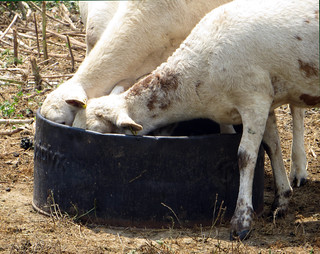The Let's Grow Committee of the American Sheep Industry Association is sponsoring its last webinar of this fiscal year with registration now open for Dietary Supplements: A Necessity or Folly?
The session will be hosted by Dr. Jay Parsons, University of Nebraska-Lincoln, and presented by Dr. Robert Van Saun, Penn State University, on Tuesday, September 22 at 8 p.m. EST. To register, go to https://attendee.gotowebinar.com/register/125169872000771074.
This webinar will look more closely at forages in determining if they can meet essential nutrient requirements of sheep at different productive stages. Fiber content of a forage is a function of plant maturity and can potentially limit intake resulting in inadequate energy or protein intake.
Forage mineral content is a complex interaction between plant, soil conditions and fertilization practices and that may result in inappropriate mineral content predisposing to disease conditions. The true wild card of forages is trace mineral status. Trace minerals are essential nutrients influencing productivity and immune response. Most forages are deficient in a number of critical trace minerals as well as having high concentrations of interfering minerals resulting in deficiency or toxicity conditions.
The goal of the webinar is to provide participants with a better perspective on how their forage may limit or promote their feeding program and the potential role for dietary supplements.
Missed the EBV Webinar?
If you missed the webinar, Using EBVs to Achieve Your Breeding Goals, presented by Dr. Dave Notter, it is now available online at www.growourflock.org by clicking on the Resources tab.
The session will be hosted by Dr. Jay Parsons, University of Nebraska-Lincoln, and presented by Dr. Robert Van Saun, Penn State University, on Tuesday, September 22 at 8 p.m. EST. To register, go to https://attendee.gotowebinar.com/register/125169872000771074.
This webinar will look more closely at forages in determining if they can meet essential nutrient requirements of sheep at different productive stages. Fiber content of a forage is a function of plant maturity and can potentially limit intake resulting in inadequate energy or protein intake.
Forage mineral content is a complex interaction between plant, soil conditions and fertilization practices and that may result in inappropriate mineral content predisposing to disease conditions. The true wild card of forages is trace mineral status. Trace minerals are essential nutrients influencing productivity and immune response. Most forages are deficient in a number of critical trace minerals as well as having high concentrations of interfering minerals resulting in deficiency or toxicity conditions.
The goal of the webinar is to provide participants with a better perspective on how their forage may limit or promote their feeding program and the potential role for dietary supplements.
Missed the EBV Webinar?
If you missed the webinar, Using EBVs to Achieve Your Breeding Goals, presented by Dr. Dave Notter, it is now available online at www.growourflock.org by clicking on the Resources tab.


No comments:
Post a Comment